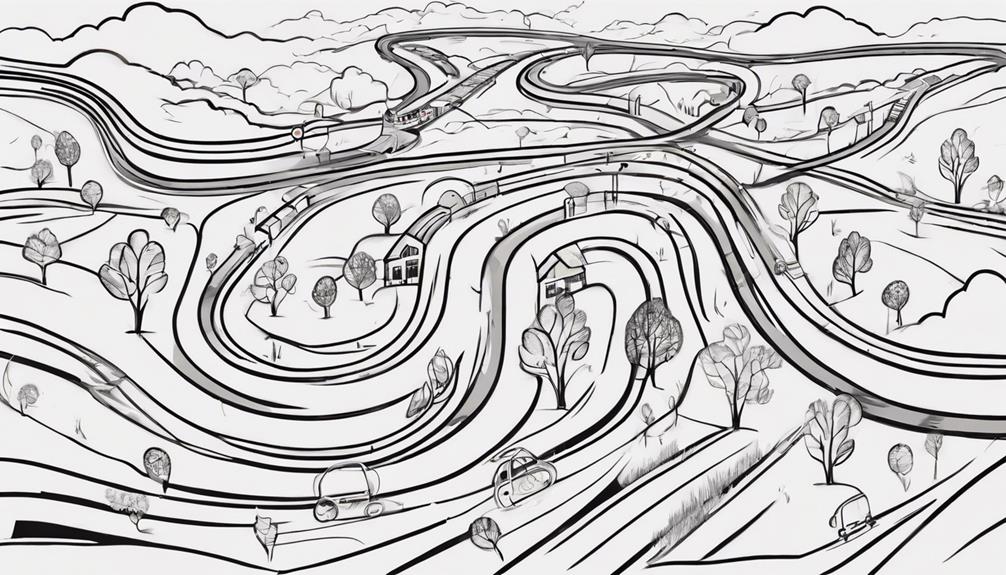The intricate interplay between our life stages and the formation of our perspectives and decisions is a subject of profound scientific inquiry and scrutiny. From the earliest moments of our existence to the twilight years of reflection, each phase brings forth a distinctive set of challenges and opportunities that sculpt our cognitive frameworks and impact the choices we make. By examining the nuanced evolution of our perspectives and decisions across various life stages, we can grasp a deeper understanding of the human psyche and the complex interplay between our developmental journey and the decisions we navigate.
Key Takeaways
- Early life stages shape emotional and cognitive development, influencing future perspectives and decisions.
- Peer relationships in adolescence impact identity formation and decision-making processes.
- Environmental factors and childhood experiences have lasting effects on values and behaviors.
- Successful navigation of life stages involves resilience, adaptation, and reflection on personal values.
Understanding Life Stages

Understanding life stages is crucial for comprehending how individuals' perspectives and decision-making processes evolve throughout different phases of development. In developmental psychology, individuals encounter unique experiences and challenges at each life stage, from infancy to late adulthood, that shape their perceptions and influence their life choices. For example, infancy is marked by the conflict of trust vs. mistrust, where the interactions with caregivers lay the foundation for future relationships and decision-making abilities. Adolescence introduces the struggle for identity formation, impacting choices related to education, career, and relationships. In late adulthood, individuals face the task of integrity vs. despair, reflecting on past decisions and life achievements. These distinct conflicts and developmental tasks at various life stages play a crucial role in shaping individuals' perspectives and influencing their life choices. By understanding these complexities through the lens of developmental psychology, we can better appreciate the nuances of human development and the factors that contribute to decision-making processes at different points in life.
Impact of Infancy
As individuals progress through infancy, the critical period for establishing bonds with caregivers significantly influences their long-term emotional development and attachment styles. During infancy, the quality of caregiving plays a pivotal role in shaping the child's sense of security and trust. Positive interactions with caregivers in this stage lay the foundation for healthy social and emotional development in the future. Infants rely on caregivers for meeting their basic needs, and the responsiveness and consistency of these caregivers impact the child's attachment style. Research shows that early experiences in infancy have a profound impact on attachment styles and emotional regulation later in life. The quality of caregiving provided during infancy not only influences emotional development but also cognitive growth and the individual's ability to form and maintain relationships in the future.
| Aspect | Description | Importance |
|---|---|---|
| Bonding with caregiver | Critical for emotional development and attachment | Establishes sense of security and trust |
| Quality of caregiving | Impacts cognitive development and future relationships | Shapes attachment style and emotional regulation |
| Reliance on caregivers | Necessary for meeting basic needs | Influences sense of safety and security |
Toddlerhood's Influence

During toddlerhood, children undergo significant developmental milestones that shape their emerging sense of autonomy and decision-making confidence. This stage is crucial in laying the groundwork for how individuals perceive themselves in relation to the world around them. Here are some key points to consider regarding the influence of toddlerhood on autonomy and decision-making:
- Autonomy Development: Toddlers start to assert their independence and explore their environment, which contributes to the development of their sense of autonomy.
- Decision-Making Confidence: The choices toddlers make during this stage help them understand the consequences of their actions, influencing their confidence in decision-making.
- Foundation for Future Patterns: Experiences and interactions during toddlerhood serve as a foundation for how individuals approach decision-making in the future.
- Self-Regulation Skills: Toddlerhood is a critical period for developing self-regulation skills, which play a significant role in decision-making abilities later in life.
- Understanding of Capabilities: The boundaries and exploration encouraged during toddlerhood shape a child's understanding of their capabilities, impacting their decision-making perspectives.
Preschool Years Perspective
During the preschool years, children's perspectives are shaped by their playful exploration of the world, fostering a sense of curiosity that drives their discovery of new concepts. This period of innocence fuels learning experiences and influences decision-making processes as preschoolers navigate their environment with a growing sense of autonomy. Preschoolers' perspectives and decisions reflect a blend of imaginative play, inquisitiveness, and the development of social and emotional skills essential for their future interactions and choices.
Playful Exploration Shapes
In the critical stage of preschool years, playful exploration serves as a foundational catalyst for fostering creativity, cognitive development, and social skills in young children.
- Playful exploration during the preschool years fosters creativity, curiosity, and cognitive development.
- Children at this stage learn through hands-on experiences, imagination, and social interactions.
- Preschoolers develop problem-solving skills, emotional intelligence, and social connections through play.
- Playful exploration in the preschool years lays the foundation for future learning, adaptability, and resilience.
- The preschool stage is crucial for developing motor skills, language abilities, and social awareness through interactive play.
Curiosity Drives Discovery
Playful exploration in the critical preschool stage not only shapes foundational cognitive development but also serves as the precursor to how curiosity drives discovery in young children. During the preschool years, children exhibit a natural curiosity that propels them to explore their surroundings, ask questions, and seek answers. This curiosity is fundamental in fostering cognitive development as it encourages hands-on exploration and sensory experiences. By nurturing curiosity during this stage, children develop essential skills such as creativity, problem-solving abilities, and a genuine thirst for knowledge. The preschool years lay a crucial foundation for lifelong learning and the development of critical thinking skills, highlighting the significance of curiosity in driving discovery and shaping the cognitive growth of young minds.
Innocence Fuels Learning
In the formative preschool years, the combination of innocence and curiosity serves as potent catalysts driving children's innate proclivity towards exploration and knowledge acquisition. Preschoolers exhibit rapid cognitive development and language acquisition, laying the foundation for future learning and decision-making skills. Play-based activities and social interactions in preschool settings foster social-emotional growth and perspective-taking abilities. Children at this stage often exhibit a growth mindset, embracing challenges and mistakes as opportunities for learning and personal development. The preschool years are crucial for forming early beliefs, attitudes, and values that shape future perspectives and decision-making processes.
- Innocence and curiosity drive children's eagerness to explore and learn.
- Rapid cognitive development and language acquisition occur during preschool years.
- Play-based activities and social interactions foster social-emotional growth.
- Preschoolers embrace challenges and mistakes as opportunities for learning.
- Early beliefs, attitudes, and values are formed during the preschool years.
Early School Years Decisions
During the early school years, children navigate crucial decisions that mold their sense of competence and lay the groundwork for future cognitive development. This period is characterized by a focus on learning new skills, establishing relationships, and achieving a sense of accomplishment. Decision-making in the early school years plays a pivotal role in shaping children's understanding of responsibility, as they begin to grasp the consequences of their choices.
Decisions related to school, friendships, and extracurricular activities are central during this stage, significantly influencing children's self-esteem and identity formation. The choices made in the early school years contribute to the development of essential problem-solving skills and decision-making abilities that will be utilized in the future.
Adolescence and Choices

Adolescents' decision-making processes are intricately influenced by a complex interplay of peer acceptance, identity formation, and ongoing brain development. During adolescence, individuals often prioritize fitting in with their peers and establishing their sense of self, which can heavily impact the choices they make. This stage is marked by an increased susceptibility to peer influence, as teenagers seek approval and validation from their social circles. Moreover, the surge in risk-taking behaviors during adolescence can be attributed to the ongoing development of the prefrontal cortex, the region responsible for decision-making and impulse control. Environmental factors such as peer pressure and societal norms also play a significant role in shaping adolescent decision-making. Additionally, adolescents exhibit heightened sensitivity to rewards and social cues, which further influences their choices and behaviors. Understanding these dynamics is crucial for comprehending the complexities of decision-making in adolescence.
Young Adulthood Realizations
Navigating the realms of young adulthood entails a period characterized by the exploration of intimate relationships and the cultivation of a personal identity. This stage in life is marked by significant self-discovery, where individuals begin to unravel their values, beliefs, and aspirations. Young adults often find themselves grappling with crucial decision-making processes that shape their future trajectories. The pursuit of personal growth becomes paramount during this phase, with many individuals prioritizing career goals and educational endeavors to lay the foundation for their future endeavors.
The realization of one's autonomy and the establishment of independence are central themes during young adulthood. This period serves as a critical juncture for individuals to define their long-term values and solidify their life goals. Moreover, the tension between seeking independence and forming meaningful connections with others is a common struggle experienced by many young adults. Through the process of self-discovery and decision-making, individuals in this life stage begin to carve out their unique paths, setting the stage for their perspectives and choices in the years to come.
Middle Adulthood Shifts

Middle adulthood marks a pivotal period where individuals often undergo significant shifts in their career trajectories and family dynamics. As people navigate through this life stage, they may contemplate changing their professional paths or reassessing their roles within their families. The transitions experienced during middle adulthood can prompt individuals to reevaluate their priorities and make decisions that align with their evolving perspectives.
Career Transitions in Midlife
During the transition into middle adulthood, individuals often undergo significant shifts in their careers as they reevaluate their priorities and seek greater fulfillment in their professional lives. This period can be a time of reflection, growth, and transformation, leading many to consider making changes in their professional paths. Some key aspects to consider regarding career transitions in midlife include:
- Pursuing long-held passions that may have been set aside earlier in life.
- Seeking greater work-life balance to maintain overall well-being.
- Exploring new opportunities for personal and professional development.
- Reflecting on past accomplishments and reassessing future goals.
- Considering the impact of changing family dynamics on career decisions.
These factors contribute to the complexity of career transitions in middle adulthood, often leading to personal growth and a renewed sense of purpose in one's professional journey.
Family Dynamics in Mid-Adulthood
In the realm of mid-adulthood, the shifting dynamics within families often revolve around transitions such as the 'empty nest' phase and the increasing responsibilities of caring for aging parents. Middle adulthood brings about a reevaluation of roles and relationships within the family unit, as individuals may experience midlife crises prompting reflections on life choices. Balancing the demands of work with caregiving roles for both children and elderly parents becomes a common challenge. Effective communication and strong support networks are crucial for navigating these changes and addressing the complexities of family dynamics in midlife. The table below highlights key aspects of family dynamics, midlife crises, and caregiving roles in mid-adulthood.
| Family Dynamics | Midlife Crises | Caregiving Roles |
|---|---|---|
| 'Empty nest' phase | Reflection on life choices | Balancing work and caregiving |
| Caring for aging parents | Reevaluation of relationships | Supporting children and elderly parents |
| Becoming grandparents | Transition in family roles | Coordinating care responsibilities |
Late Adulthood Reflections
Late adulthood reflections in the human lifespan often serve as a pivotal period where individuals engage in profound contemplation of their life's trajectory and seek to impart wisdom gained from their experiences. This stage is marked by a deep introspection into one's choices, accomplishments, and relationships, leading to a heightened awareness of one's legacy and the desire to leave behind a meaningful impact for future generations. Late adulthood is also characterized by a pursuit of fulfillment and contentment, as individuals strive to find satisfaction in their past accomplishments and present circumstances. Wisdom, a hallmark of this stage, is drawn from a culmination of life experiences, enabling individuals to offer valuable guidance and perspective to others. In summary, late adulthood is a time of reflection, consolidation, and sharing of wisdom and insights gathered over a lifetime.
- Introspection into life choices and accomplishments
- Desire to leave behind a meaningful legacy
- Pursuit of fulfillment and contentment
- Drawing wisdom from life experiences
- Sharing guidance and perspective with others
Piaget's Cognitive Development Theory

Examining Piaget's Cognitive Development Theory sheds light on how individuals actively construct knowledge through interactions with their environment, emphasizing the progression through distinct stages of thinking and understanding. Piaget proposed four stages of cognitive development: sensorimotor, preoperational, concrete operational, and formal operational. Each stage represents a unique way of comprehending the world, with later stages building upon the foundations laid in earlier ones. Central to Piaget's theory is the idea that cognitive development is a continuous process influenced by experiences and interactions. He stressed the significance of active learning and exploration in shaping an individual's cognitive abilities. The theory highlights that as individuals engage with their surroundings, they adapt and assimilate new information, leading to cognitive growth. By understanding the stages of cognitive development and the role of experiences and interactions, we gain insights into how individuals evolve in their thinking and understanding of the world.
Levinson's Seasons of Life
Levinson's Seasons of Life theory highlights the significance of developmental stages in shaping an individual's decision-making processes. As individuals progress through different eras, their perspectives evolve in response to the unique psychological tasks and challenges they face. This theory underscores how priorities and perspectives shift with age, influencing the way individuals approach life's complexities.
Developmental Stages Impact Decisions
Developmental stages play a crucial role in shaping individuals' perspectives and influencing their decision-making processes, as proposed by Levinson's Seasons of Life theory. This theory suggests that different stages of life come with specific developmental tasks and challenges that impact how individuals perceive the world and make choices. The transitions between these stages mark significant shifts in perspectives, influenced by life events and societal expectations. Identity formation and role transitions are highlighted as key components during these developmental stages. Understanding the way in which developmental stages shape perspectives provides valuable insights into how individuals navigate decision-making processes and ultimately determine their life trajectories.
- Distinct stages with unique developmental tasks and challenges
- Key transitions influencing perspectives
- Impact of life events and societal expectations
- Importance of identity formation and role transitions
- Insights into decision-making processes and life trajectories
Perspectives Shift With Age
The evolution of perspectives with age, as proposed by Levinson's Seasons of Life theory, underscores the dynamic interplay between individual development and decision-making processes. As individuals progress through different life stages, their perspectives on life and their decision-making criteria undergo significant transformations. Below is a table illustrating the key aspects of how perspectives and decision-making are influenced across various life stages:
| Life Stage | Perspectives | Decision-Making |
|---|---|---|
| Young Adulthood | Identity formation, exploration | Risk-taking, self-discovery |
| Middle Adulthood | Contribution to society, legacy | Stability, societal impact |
| Late Adulthood | Reflection, life experiences | Legacy, fulfillment |
Understanding these shifts can aid individuals in navigating the complexities of decision-making at each stage of life.
Changing Priorities With Time
Changing Priorities With Time in human life stages reflect the evolving values and aspirations individuals prioritize as they progress through adulthood.
- Career choices and aspirations undergo transformations as individuals move through different life stages.
- Relationship priorities shift, impacting decisions related to personal connections and commitments.
- Financial goals evolve, influencing decision-making processes concerning savings, investments, and expenditures.
- Health and well-being become increasingly significant priorities, affecting lifestyle choices and habits.
- Personal development goals change, leading individuals to seek continuous growth and self-improvement opportunities.
Understanding these changing priorities is crucial for navigating life transitions and making informed decisions in various aspects of one's life. Levinson's Seasons of Life theory provides valuable insights into the dynamic nature of human development and the impact of shifting priorities on individual perspectives and choices.
Riegel's Development Dimensions
Riegel's Development Dimensions theory intricately explores the multifaceted interplay between various stages of human development, emphasizing the dynamic and interconnected nature of these dimensions. Klaus Riegel's theory introduces 12 dimensions that shed light on the complex relationship between different life stages. These dimensions encompass biological, psychological, social, and cultural aspects, illustrating the intricate web of influences that shape human development. Riegel's model underscores the dynamic nature of growth, where each stage not only impacts the individual but is also influenced by preceding and subsequent stages. This interconnectedness highlights the continuous navigation individuals undertake throughout their lives, influencing their perspectives and decisions. By understanding Riegel's Development Dimensions, we gain valuable insights into the interplay between life stages and how these interactions mold human experiences and choices. This holistic approach provides a comprehensive framework for comprehending the intricate mechanisms at play during various phases of development.
Navigating Life Stages Successfully

Understanding the intricate interplay between various dimensions of human development sheds light on how individuals can successfully navigate the complexities of different life stages. Successful navigation of life stages involves adapting to changing circumstances and learning from past experiences. Developing resilience and coping strategies can help individuals overcome challenges encountered during different life stages. Building a support network and seeking guidance from mentors or professionals can aid in navigating transitions effectively. Reflecting on personal values and goals at each life stage can guide decision-making and promote a sense of purpose. Embracing change and maintaining a growth mindset fosters flexibility and adaptability to thrive in diverse life stages. By integrating these coping strategies and experiences, individuals can enhance their ability to navigate through the various challenges and opportunities that different life stages present.
Personal Growth in Different Stages
Personal growth is a dynamic process that unfolds differently across various life stages. Childhood experiences lay the foundation for future development, shaping individuals' perceptions and behaviors. Adolescence and adulthood are characterized by identity exploration and self-discovery journeys, respectively, each playing a crucial role in shaping personal growth.
Childhood Shaping Future
During the formative years of childhood, individuals undergo crucial experiences that lay the groundwork for their future personal growth and decision-making processes. These early interactions, relationships, and learning experiences in childhood have a significant impact on long-term personal development. Childhood environments play a pivotal role in shaping values, beliefs, and behaviors that ultimately guide decision-making. Cognitive and emotional development during childhood serves as the foundation for future perspectives and decision-making abilities. Furthermore, both childhood trauma and positive experiences can leave lasting effects on how individuals perceive and navigate different life stages.
- Early interactions, relationships, and learning experiences shape long-term personal growth.
- Childhood environments influence the development of values, beliefs, and behaviors.
- Cognitive and emotional development in childhood lays the foundation for future decision-making.
- Childhood trauma or positive experiences can have lasting effects on individuals.
Adolescent Identity Exploration
In the stage of adolescent identity exploration, individuals engage in a critical developmental task that involves questioning and experimenting with various roles and values. Peer relationships play a significant role during this stage, as adolescents seek acceptance and validation while shaping their identities. However, this period is also marked by identity confusion and experimentation, which can lead to increased risk-taking behaviors and emotional volatility. Adolescents often engage in self-reflection to explore personal beliefs and values, striving to form a cohesive sense of self. This exploration phase lays the groundwork for future decision-making processes and significantly influences individuals' perspectives and choices in later life stages.
| Aspect | Description | Impact |
|---|---|---|
| Adolescent identity exploration | Critical developmental task involving questioning and experimenting with roles and values | Shapes individual's sense of self and decision-making |
| Peer relationships | Significant role in shaping identity, seeking acceptance and validation | Influences identity formation and social interactions |
| Risk-taking behaviors | Increased during identity exploration, can stem from experimentation and seeking identity | Impacts decision-making and emotional development |
Adult Self-Discovery Journey
Embarking on the journey of self-discovery in adulthood involves a deliberate exploration of one's values, beliefs, and goals to cultivate personal growth and fulfillment.
- Seeking new experiences, relationships, and challenges to expand perspectives.
- Embracing change and adapting to evolving priorities for self-understanding and transformation.
- Engaging in self-care practices to enhance the self-discovery process.
- Embracing mindfulness techniques to foster introspection and reflection.
- Seeking support from others to navigate the complexities of adult self-discovery.
Behavioral Changes Across Ages
Behavioral transformations across various life stages delineate fundamental shifts in decision-making processes and preferences. Cognitive development plays a crucial role in shaping how individuals approach decisions at different points in their lives. During adolescence, ongoing brain development may lead to more impulsive behaviors as young people navigate their changing cognitive abilities. In contrast, older adults often prioritize emotional regulation and rely on their wealth of experience for decision-making. Environmental factors also significantly influence behaviors and decision-making tendencies across life stages, further highlighting the complex interplay between internal and external influences on behavior. Understanding these behavioral changes across ages is essential for comprehending how individuals adapt their decision-making strategies throughout their lives. By recognizing the impact of cognitive development, experiences, and environmental influences, we can gain insights into the nuanced ways in which behavior evolves across different life stages.
Frequently Asked Questions
Why Is It Important to Understand Life Stages?
Understanding life stages is crucial for grasping transitions, safeguarding mental health, and enhancing decision-making skills. It enables a comprehensive view of human development, facilitating tailored support and interventions in various professional fields. Recognizing the significance of life stages fosters personal growth, self-awareness, and effective goal setting. This knowledge serves as a foundation for empathizing with others' perspectives and establishing meaningful interpersonal connections.
What Does It Mean to Be in Different Stages of Life?
Being in different life stages signifies transitioning through periods characterized by emotional maturity, cognitive development, social relationships, career choices, personal growth, and life transitions. Each stage presents unique challenges and opportunities that shape our perspectives and decisions. It symbolizes a continuous journey of self-discovery, growth, and adaptation to the evolving demands of life. Embracing these stages allows individuals to navigate through various experiences, contributing to their overall development and understanding of the world.
Why Is It Important to Consider Lifespan Perspectives?
Considering lifespan perspectives is crucial in developmental psychology. It allows us to comprehend the cumulative impact of cognitive changes, social relationships, emotional well-being, and physical health across different life stages. Understanding how cultural influences interact with experiences at various stages aids in appreciating the interconnectedness of these factors. This knowledge is vital for recognizing how each life stage shapes perspectives, values, and decision-making strategies, ultimately contributing to a holistic understanding of human development.
What Are the Major Perspectives on Lifespan Development?
Major perspectives on lifespan development encompass Nature vs. Nurture debates, emphasizing genetic and environmental influences on cognitive development. Social Influences, entwined with Attachment Theory, underscore the significance of relationships in shaping individuals. Psychosocial Crises, proposed by Erikson, highlight age-related developmental tasks. Cultural Differences illuminate how diverse societies mold behaviors and beliefs. Integrating these perspectives offers a comprehensive understanding of human development across the lifespan.
Conclusion
In conclusion, the impact of different life stages on our perspectives and decisions is a complex and intricate process that shapes our identities and behaviors. By understanding the various stages of life from infancy to late adulthood, we can gain insight into the challenges and opportunities that shape our development. It is essential to navigate these stages successfully to achieve personal growth and adapt to the changing demands of each phase of life.
